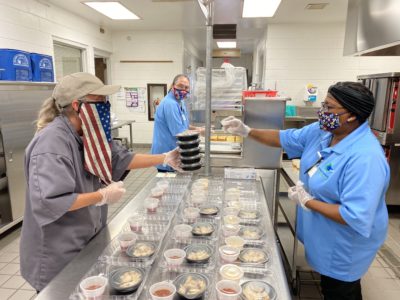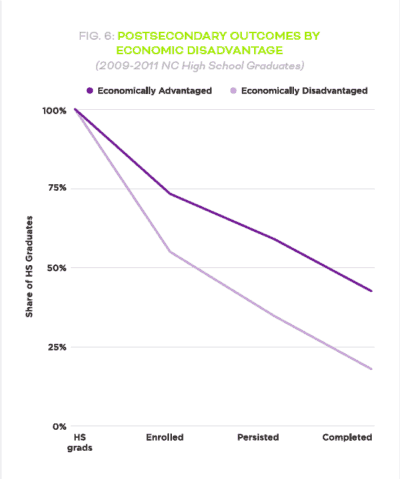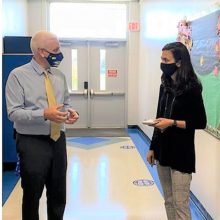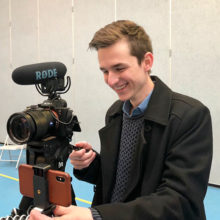
Toby Bollinger, a veteran and student at Asheville-Buncombe Technical Community College, saw his scholarships and financial aid disappear after making a simple mistake on his FAFSA. Suddenly, Bollinger found himself unable to pay his $900 monthly rent, unsure of where to turn or how to ask for help.
Bollinger ultimately paid his rent with support from Single Stop, a national nonprofit that works to provide coordinated access to a safety net of benefits and connect people to the resources they need to attain higher education, obtain good jobs, and achieve financial self-sufficiency.
But many students navigate higher education without connections to resources that meet their basic needs. A recent national study found that nearly half of students in two-year colleges experienced food insecurity — limited or uncertain access to a sufficient quantity of affordable, nutritious food — and about three out of five experienced housing insecurity, which includes a broad set of challenges such as the inability to pay rent or utilities. And, according to the federal Government Accountability Office, food insecurity and housing insecurity impede students who are trying to get a degree or credential after high school.
With the establishment of North Carolina’s statewide attainment goal — 2 million 25- to 44-year-olds with a high-quality credential or college degree by 2030 — boosting postsecondary attainment is a topic of frequent discussion at education conferences, board meetings, and the like. Current projections are that North Carolina will have about 1.6 million adults who meet that attainment definition in 2030 — which means roughly 400,000 more residents will need to attain a postsecondary degree or credential to meet the demands of the state’s businesses and industries.
For students experiencing poverty, the journey to and through college is even more challenging. Among the students who graduated from a North Carolina public high school between 2009 and 2011 and enrolled in a postsecondary program before May 2012, economically disadvantaged students were less likely to enroll in a postsecondary degree program, persist to their second year of that program, and complete a degree or credential. Just one in three economically disadvantaged students completed a degree or credential in six years — compared with about three in five economically advantaged students.
These data, which come from a series of myFutureNC data briefings compiled by Carolina Demography, paint a clear picture: Strategies to boost postsecondary attainment must address poverty and economic disadvantage by working to meet students’ basic needs.
Meeting basic needs in a ‘Single Stop’
For many college students, unforeseen financial challenges — from a flat tire to legal fees to difficulty accessing federal benefits — can keep then from meeting basic needs, hindering their ability to attend classes, keep up with coursework, and pursue a higher education. Many college campuses offer services to support students through those hardships, but resources may be siloed across numerous organization or offices, difficult to access, or underutilized by students.
That’s where Single Stop’s solution comes in.
Launched in 2001, Single Stop USA is a national nonprofit organization that works to reduce poverty and help low-income families and students achieve economic security. Single Stop’s mission is to “build pathways out of poverty by leveraging partnerships and technology to connect people to existing resources, all through a unique one-stop shop.”
One of the ways Single Stop works is by establishing those “one-stop shops” on community college campuses where students can get coordinated wraparound support services such as benefits screening and application assistance, tax preparation services and financial counseling. Single Stop partners with colleges to integrate their economic empowerment model with student support and financial aid departments on campus, with the goal of increasing student retention and graduation. Single Stop’s college partnership model is outlined below.
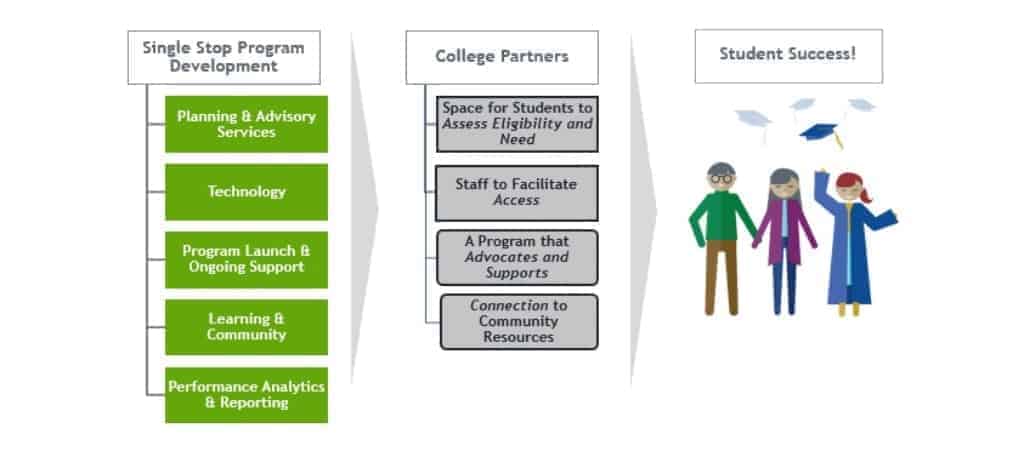
Since Single Stop’s education programming launched in 2009, its offices have spread to more than 30 campuses from Oregon to Massachusetts, connecting 269,272 students to $548 million in benefits and services. In North Carolina, Single Stop has offices at two universities (Winston-Salem State, Johnson C. Smith) and eight community colleges (Asheville-Buncombe Technical, Davidson, Nash, Edgecombe, James Sprunt, Central Piedmont, Alamance, and Robeson).
Boosting postsecondary attainment
Single Stop’s impact on postsecondary attainment in North Carolina is evident through the personal stories of students — like Bollinger’s — and also backed up by data.
At Nash Community College, Single Stop has facilitated about 450 screenings resulting in $4.5 million worth of benefits for students — an average of $10,000 per student. In a retention and persistence study completed a few years ago, students who used Single Stop services had up to a 56% higher retention rate from year to year than their peers who did not use the services. And, Single Stop participants completed more credit hours per semester than they did before they sought help.
Marbeth Holmes, dean of student wellness and a professor at the college, feels confident that an upcoming retention and persistence study will show similar results.
“We use the data to encourage faculty and students to seek out help, to shatter the stigma of help-seeking … and to demonstrate the value in seeking help when you need it rather than waiting until it gets to the crisis point,” said Holmes. “We do about 50 class presentations each semester, letting students know about the resources and encouraging them to come out and use them before things collapse.”
Beyond North Carolina, a recent study by Metis Associates showed Single Stop’s impact on improving student outcomes at the Community College of Philadelphia (CCP). Roughly 96% of the study’s findings point to Single Stop services having a significant positive impact on three key target outcomes for both first-time college students and those who had prior college experience: semester-to-semester persistence, credit pass rates, and weighted GPA.
These results resonate especially with Melissa Aponte, a student at CCP.
“I faced every barrier listed on there that was designed for me to not be successful here at community college,” Aponte said. “I’m a non-traditional student, I’m a student-parent … and dealing with the systems, I’ve never felt so low [than] to ask for help. And thinking that those statistics were going to keep me in a hole. Now, I’m in honors, and I’m involved on campus because of services like this. Single Stop can really help you stay here.”
The study found that students using Single Stop services at CCP were much more likely to persist in college and had significantly higher ratios of completed to attempted credits than their counterparts. First-time college students at CCP using Single Stop also had, on average, significantly higher weighted GPAs than their counterparts.
Further, the study found that there was no single service that proved responsible for the results.
“They [Single Stop] tailored the services to individuals so they’re getting exactly what they need,” said Michael Scuello, senior associate for design and analysis at Metis Associates. “So these results actually make a great deal of sense. We shouldn’t find one single service that’s driving the results because these students are getting the services they need to get the results they need. That’s how wraparound services work.”
Aponte provided this advice for her fellow students at CCP:
“Just connect with people and don’t be afraid to ask for help. It doesn’t make you less of a person and [isn’t something] to be ashamed of … that’s your only opportunity to be successful in school.”
This is the first piece in a series on challenges facing community college students titled: An Extra Hill to Climb. The series is a partnership between EdNC.org and Spotlight on Poverty and Opportunity. Spotlight is a non-partisan initiative that gathers diverse perspectives to tell compelling stories illustrating the economic hardship confronting millions of Americans and to lift up genuine solutions. EdNC.org and Spotlight partnered to illustrate the challenges facing many community college students through stories from North Carolina and data illustrating the broader challenges in the United States.
Recommended reading
